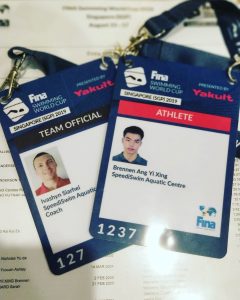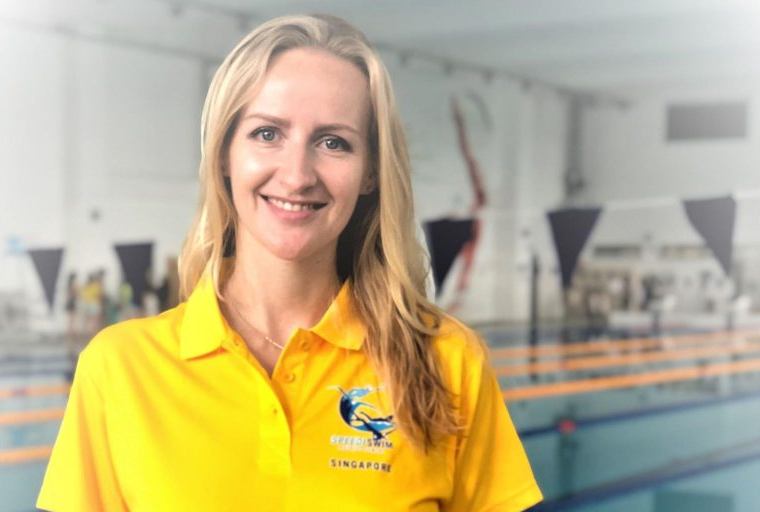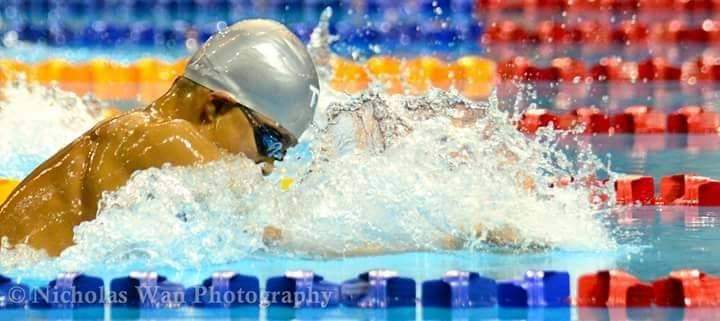
How it started?
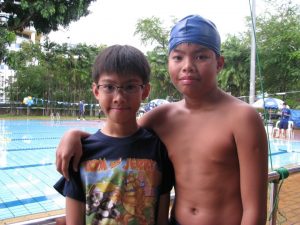
When I was young, my first memories of competitive swimming were that of watching my father race a 50m freestyle during a friendly meet against other competitors half his age. Watching his gallant figure from the poolside as he gave his all, gave me inspiration to follow into his footsteps and pursue my love for the sport since young.
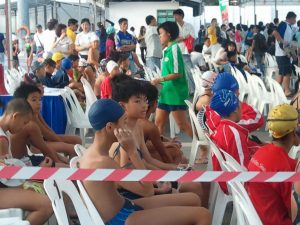 My sporting career first started at 12 when my coach signed me up for the Junior Interclub Swimming Championship with the national record timing as my QET (qualifying entry time). Naturally it was a nerve-wrecking experience for me, as sceptical eyes fell onto me from both spectators and competitors alike. To surmise, my first race left me defeated but undeterred as I remain unwavered achieving my goal to strive for the submit.
My sporting career first started at 12 when my coach signed me up for the Junior Interclub Swimming Championship with the national record timing as my QET (qualifying entry time). Naturally it was a nerve-wrecking experience for me, as sceptical eyes fell onto me from both spectators and competitors alike. To surmise, my first race left me defeated but undeterred as I remain unwavered achieving my goal to strive for the submit.
My first FINA experience
My first break was at 14 years old, during which I was accepted into APSC’s Red White team which gave me more opportunities to train with the nation’s best. During this period, with my qualifications into SNAG’s B finals for my pet events; the 100m and 200m breaststroke I earned my spot then as Singapore’s top 50 ranked swimmers. With some persuasion from Uncle Peng Siong later that year, I would be registered to partake in the FINA World Cup as a representative of the club to gain better insights as to how top athletes conduct themselves during major meets.
 During my first FINA race, it was a surreal experience since there was so much energy in the air. Many of the athletes there were dogmatic in their pre-race preparations, while I was intimidated initially, the excitement of getting to meet many superstars such as Kevin Cordes ( member of the 4x100m Medley Relay, Gold Medal, 2016 Rio Olympic Games), gave me the adrenaline rush to overcome my fear and take to the pool with my utmost efforts. My first FINA gave me much experience, exposure and motivation which in its own way increased my self-confidence and constantly served as a form of encouragement to be self-critical of my progression throughout each season.
During my first FINA race, it was a surreal experience since there was so much energy in the air. Many of the athletes there were dogmatic in their pre-race preparations, while I was intimidated initially, the excitement of getting to meet many superstars such as Kevin Cordes ( member of the 4x100m Medley Relay, Gold Medal, 2016 Rio Olympic Games), gave me the adrenaline rush to overcome my fear and take to the pool with my utmost efforts. My first FINA gave me much experience, exposure and motivation which in its own way increased my self-confidence and constantly served as a form of encouragement to be self-critical of my progression throughout each season.
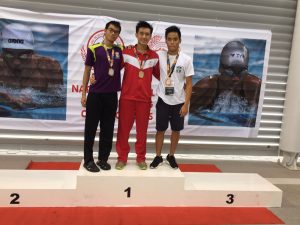 Throughout the years from 2013-2016, some of my notable achievements were:
Throughout the years from 2013-2016, some of my notable achievements were:
How and why I joined SpeediSwim
As I advanced into my tertiary education, my student-athlete life got more hectic given the increase stress and workload. This meant that I had to plan my schedules more meticulously for both studies and sports alike. As I ended school very late, finding a club with such training schedules was difficult and more often I would train independently at OCBC AQC, thankfully one of my closest friends who was training at SpeediSwim then, recommended me to joining the club.
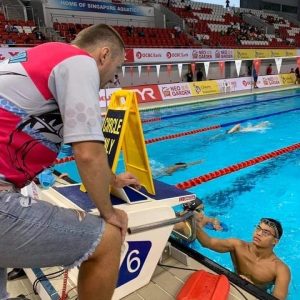 At first, I didn’t know how I would fit into the new culture of the club, but surprisingly, my coach (Siarhei) was a very understanding coach and would often take time to discuss the swim-cycles for the month with me, whilst mapping out both the short- and long-term targets that we both like to see for upcoming test sets and races. I think it really helped to put into perspective when planning for both my major exams and races alike. Discussion with the coach also help forge mutual trust and understanding between us both which was essential in the pool as it allows us to better execute the training plans while bouncing off feedbacks for each other.
At first, I didn’t know how I would fit into the new culture of the club, but surprisingly, my coach (Siarhei) was a very understanding coach and would often take time to discuss the swim-cycles for the month with me, whilst mapping out both the short- and long-term targets that we both like to see for upcoming test sets and races. I think it really helped to put into perspective when planning for both my major exams and races alike. Discussion with the coach also help forge mutual trust and understanding between us both which was essential in the pool as it allows us to better execute the training plans while bouncing off feedbacks for each other.
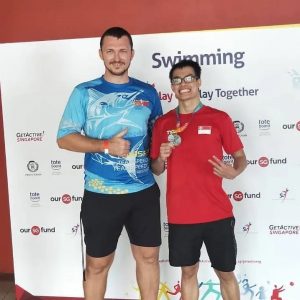 What makes SpeediSwim a club I can call home is the amount of support I get from everyone. Whenever I represent the club for major meets such as SNSC, SNAG or FINA. The parents, staffs and swimmers would often make it a point come down and cheer for me. It hits differently knowing that everyone is backing me during my races, and more often it blows off my nervousness while giving me the boost needed to give it my all.
What makes SpeediSwim a club I can call home is the amount of support I get from everyone. Whenever I represent the club for major meets such as SNSC, SNAG or FINA. The parents, staffs and swimmers would often make it a point come down and cheer for me. It hits differently knowing that everyone is backing me during my races, and more often it blows off my nervousness while giving me the boost needed to give it my all.
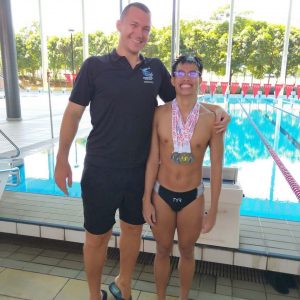 Also, Coach Siarhei’s pedagogy of coaching revolves around the refinement of techniques and having good fundamentals instilled instead of the traditional high intensity Vo2 workouts that many coaches standby. As one ages, their body starts to become well developed which means it is imperative to find ways to refine the energy wasted through inefficient strokes and optimize it to produce the maximum DPS (distance per stroke), thereby allowing swimmers more opinions in planning out their race strategies.
Also, Coach Siarhei’s pedagogy of coaching revolves around the refinement of techniques and having good fundamentals instilled instead of the traditional high intensity Vo2 workouts that many coaches standby. As one ages, their body starts to become well developed which means it is imperative to find ways to refine the energy wasted through inefficient strokes and optimize it to produce the maximum DPS (distance per stroke), thereby allowing swimmers more opinions in planning out their race strategies.
Aristotle once said “You are what you repeatedly do. Excellence ought to be a habit, not an act”. Swimming allows one to be able to express themselves openly, from their techniques all the way to their results. It’s a testament of how much effort one puts into to express themselves on the canvass, to paint their ideal form of victory for others to admire in generations to come.
Being able to compete for nearly half my life has been a blessing to me. What started out as a disastrous first race that may have left many shaken, but it has instead been my stepping stone to steadfastly forge my path into the swimming community at large while building my character.
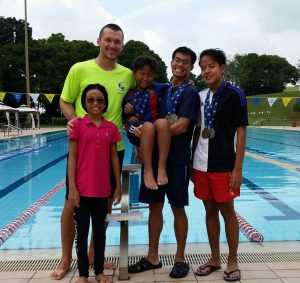 Moreover, during my journey I’ve got to meet many amazing individuals, of which we got to bond together for the love for the sport. To see them continuously strive for excellence even on the most marginal of errors, despite being at the top shows their humility and how small steps in the right direction can end up being the biggest step of your life!
Moreover, during my journey I’ve got to meet many amazing individuals, of which we got to bond together for the love for the sport. To see them continuously strive for excellence even on the most marginal of errors, despite being at the top shows their humility and how small steps in the right direction can end up being the biggest step of your life!
